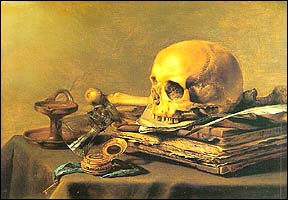
|

Metaphysical concerns are the common subject of their poetry, which investigates the world by rational discussion of its phenomena rather than by intuition or mysticism. DRYDEN was the first to apply the term to 17th-century poetry when, in 1693, he criticized Donne: 'He affects the Metaphysics... in his amorous verses, where nature only should reign; and perplexes the minds of the fair sex with nice speculations of philosophy, when he should engage their hearts.' He disapproved of Donne's stylistic excesses, particularly his extravagant conceits (or witty comparisons) and his tendency towards hyperbolic abstractions. JOHNSON consolidated the argument in THE LIVES OF THE POETS, where he noted (with reference to Cowley) that 'about the beginning of the seventeenth century appeared a race of writers that may be termed the metaphysical poets'. He went on to describe the far-fetched nature of their comparisons as 'a kind of discordia concors; a combination of dissimilar images, or discovery of occult resemblances in things apparently unlike'. Examples of the practice Johnson condemned would include the extended comparison of love with astrology (by Donne) and of the soul with a drop of dew (by Marvell).
Text excerpted from: The Cambridge Guide to Literature in English. Ian Ousby, Ed. Cambridge, Cambridge University Press, 1998. 623.  Metaphysical Poets - The Columbia Encyclopedia The Metaphysical Poets - Andrew Moore John Donne & His Followers - Prof. Jennifer Mooney Metaphysical Poets - Prof. Jennifer Mooney Introduction to "Metaphysical Lyrics & Poems of the 17th C" - Herbert J. C. Grierson The Sacred Poets - Cambridge History &c. The Metaphysical Fashion - Rev. F. E. Hutchinson Critics on Metaphysical Poetry - Matt Steggle
Site copyright ©1996-2010 Anniina Jokinen. All rights reserved. Created by Anniina Jokinen on July 28, 2000. Last updated on July 17, 2010. |


